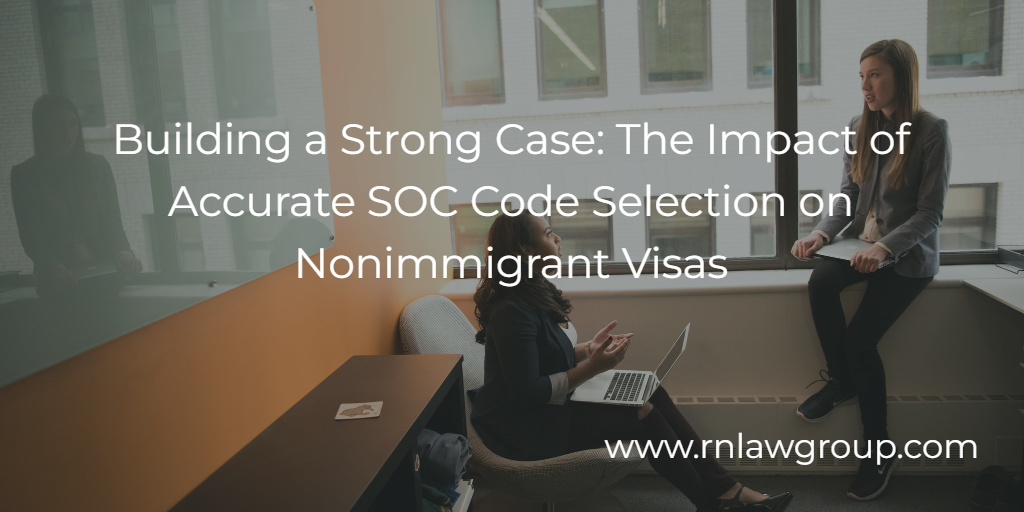
Building a Strong Case: The Impact of Accurate SOC Code Selection on Nonimmigrant Visas
An SOC (Standard Occupational Classification) code is a crucial component in the U.S. employment-based immigration process, particularly when applying for certain types of nonimmigrant visas, such as the H-1B and E-3 visa or the employment-based green card process for (EB-2 and EB-3 categories). The SOC system is maintained by the U.S. Department of Labor and serves as a standardized classification system for all occupations in the United States. Each occupation is assigned a unique SOC code that corresponds to a specific job title, set of duties, and skill requirements.
The importance of an SOC code in U.S. employment-based immigration lies in its role in determining the eligibility, appropriateness, and wage levels associated with the job offer provided by a U.S. employer to a foreign worker. The correct selection of the Standard Occupational Classification (SOC) code is of utmost significance in the context of nonimmigrant visas, such as the H-1B visa, because it directly affects the eligibility, appropriateness, and approval of the visa application. The SOC code accurately represents the nature of the job being offered and helps immigration authorities determine whether the position qualifies as a “specialty occupation,” which is a fundamental requirement for obtaining certain nonimmigrant visas like the H-1B.
Selecting the correct SOC code is essential when filing a Labor Condition Application (LCA) as part of the process for obtaining an H-1B visa or E-3 visa. The LCA is a critical component of these nonimmigrant visa applications, and the accuracy of the SOC code directly impacts the approval of the LCA and, consequently, the overall visa process. Here’s why the correct SOC code is important for the LCA:
- Job Classification and Eligibility: The SOC code accurately classifies the occupation associated with the job position for which the LCA is being filed. This classification is crucial for demonstrating that the job is a “specialty occupation” that meets the eligibility criteria for H-1B or E-3 visa sponsorship. Selecting an appropriate SOC code ensures that the offered position aligns with the visa’s requirements.
- Wage Determination: The SOC code is used to determine the prevailing wage for the offered position based on the geographic location and the skill level associated with that specific occupation. Accurate wage determination is essential for complying with the wage requirements of the H-1B or E-3 visa program. The sponsoring employer must be sure to offer a wage equal to or higher than the appropriate wage level associated with the SOC code in the geographic location of the intended place of employment. The wage is subject to change after June 30th every fiscal year even within the same SOC Code and occupation title.
- Labor Certification Compliance: The LCA process includes a requirement to attest that the employment of the foreign worker will not adversely affect the working conditions of similarly employed U.S. workers. The SOC code’s accuracy ensures that the foreign worker’s employment aligns with the wage and working conditions of U.S. workers in the same occupation.
- Minimizing RFEs and Delays: Incorrect SOC code selection can trigger Requests for Evidence (RFEs) from U.S. Citizenship and Immigration Services (USCIS) during the visa application process. Specifically, the RFEs will be regarding the specialty occupation nature of the offered position which will fall heavily on the evidence proving the beneficiary’s proffered position falls within the SOC Code occupation category’s general job duties and description. When the selected SOC occupation generally does not require at least a bachelor’s degree in a related field, then it becomes even more difficult to overcome this RFE issue even if the beneficiary earned a higher level degree in a related field. These RFEs can lead to significant delays in processing and may require additional documentation to clarify the situation. Proper SOC code selection reduces the likelihood of such delays.
- Consistency with Job Description: The SOC code should correspond accurately with the job duties and responsibilities provided in the LCA and visa application. Consistency between the SOC code, job description, and other supporting documents reinforces the credibility of the application. Employers can use online tools such as the Occupational Outlook Handbook (OOH) and O*NET Online websites to assist in determining the most fitting SOC Code for any sponsored position.
- Ensuring Visa Integrity: Accurate SOC code selection is vital for maintaining the integrity of the visa application process. Choosing an incorrect SOC code could be interpreted as an attempt to misrepresent the nature of the job or manipulate the system, which could result in visa denials and legal consequences.
- Regulatory Compliance: The Department of Labor (DOL) oversees the LCA process to ensure that employers comply with the requirements of the H-1B and E-3 visa programs. Accurate SOC code selection demonstrates the employer’s commitment to following the regulations and accurately reflecting the job being offered.
- Avoiding Audit and Penalties: Inconsistencies or discrepancies between the SOC code, job description, and other application details could trigger audits or investigations by the DOL. Proper SOC code selection helps avoid potential penalties, fines, or negative consequences associated with noncompliance.
It is also worth noting that SOC codes (Standard Occupational Classification) and occupation titles can be subject to change over time. The U.S. Bureau of Labor Statistics (BLS) periodically updates the SOC system to reflect changes in the job market, emerging industries, and evolving job roles. These updates aim to ensure that the classification system remains accurate, relevant, and reflective of the changing nature of work. The BLS also uses their afforded discretion to update the wage level prevailing wages of each geographic location. These changes will typically take effect on July 1st of each calendar year. Here are some key points to consider regarding changes in SOC codes and occupation titles:
- Regular Updates: The SOC system is typically updated every few years to accommodate shifts in the workforce and to capture new occupations that emerge due to technological advancements, economic changes, and other factors.
- Emerging Occupations: As new industries and technologies emerge, new job roles are created that may not fit neatly into existing SOC codes. In such cases, the BLS may introduce new codes or modify existing ones to account for these changes.
- Obsolete Occupations: Certain job roles may become obsolete due to changes in technology, industry trends, or other factors. In such cases, SOC codes associated with these outdated occupations might be discontinued or merged into other categories.
- Job Role Evolution: Over time, the responsibilities and requirements of certain job roles can evolve. As a result, the descriptions and codes associated with these occupations might be updated to better reflect their current nature.
- Industry-Specific Changes: Some industries may experience rapid changes in job roles and responsibilities. SOC codes may be adjusted to accommodate these changes and accurately represent the skill sets needed in those industries.
In summary, selecting the correct SOC code is a critical aspect of the Labor Condition Application process for nonimmigrant visas like H-1B and E-3 visas and the employment-based green card process alike. It ensures that the job position aligns with the visa’s requirements, facilitates accurate wage determination, demonstrates compliance with labor regulations, minimizes delays and RFEs, and maintains the integrity of the visa application process. Employers and their legal representatives should exercise diligence in accurately identifying the most appropriate SOC code for the offered position to enhance the chances of a successful visa application.
Reddy & Neumann has been serving the business community for over 20 years and is Houston’s largest immigration law firm focused solely on US. Employment-based immigration. We work with both employers and their employees, helping them navigate the immigration process quickly and cost-effectively.
By: Jeanetly Garcia
Jeanetly Garcia advises employers and individuals through all phases of the non-immigrant visa process. As an attorney in the H-1B Department at Reddy Neumann Brown PC she is experienced in filing nonimmigrant petitions and applications for immigrant benefits, as well as, responding to USCIS issued requests for evidence concerning an array of legal issues.

